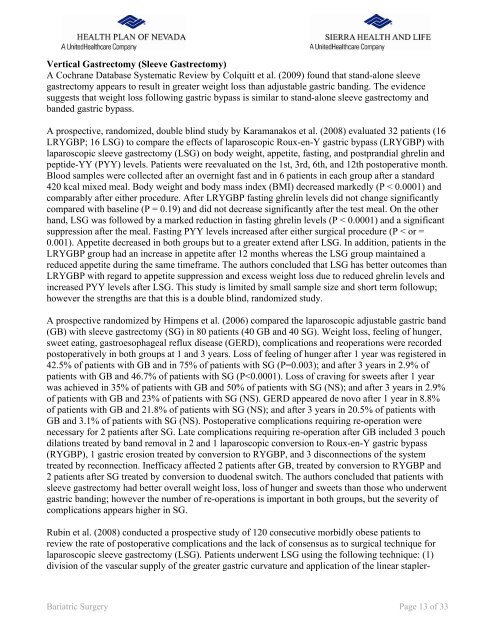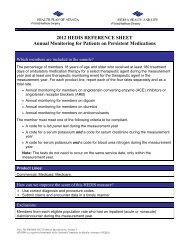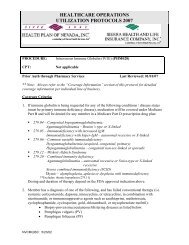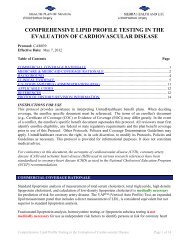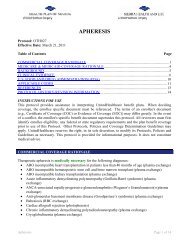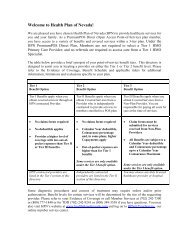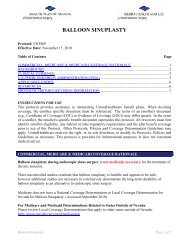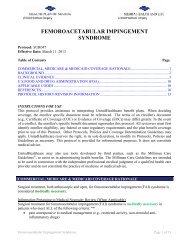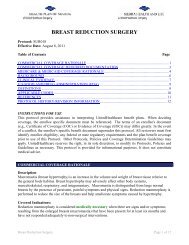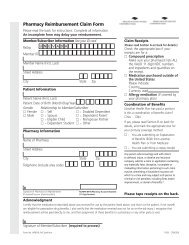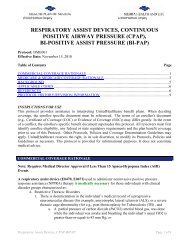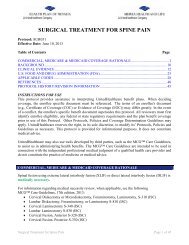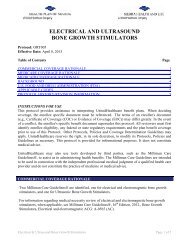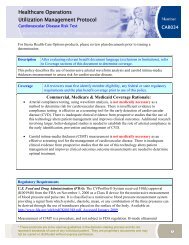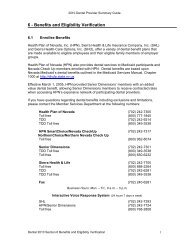BARIATRIC SURGERY - Health Plan of Nevada
BARIATRIC SURGERY - Health Plan of Nevada
BARIATRIC SURGERY - Health Plan of Nevada
You also want an ePaper? Increase the reach of your titles
YUMPU automatically turns print PDFs into web optimized ePapers that Google loves.
Vertical Gastrectomy (Sleeve Gastrectomy)<br />
A Cochrane Database Systematic Review by Colquitt et al. (2009) found that stand-alone sleeve<br />
gastrectomy appears to result in greater weight loss than adjustable gastric banding. The evidence<br />
suggests that weight loss following gastric bypass is similar to stand-alone sleeve gastrectomy and<br />
banded gastric bypass.<br />
A prospective, randomized, double blind study by Karamanakos et al. (2008) evaluated 32 patients (16<br />
LRYGBP; 16 LSG) to compare the effects <strong>of</strong> laparoscopic Roux-en-Y gastric bypass (LRYGBP) with<br />
laparoscopic sleeve gastrectomy (LSG) on body weight, appetite, fasting, and postprandial ghrelin and<br />
peptide-YY (PYY) levels. Patients were reevaluated on the 1st, 3rd, 6th, and 12th postoperative month.<br />
Blood samples were collected after an overnight fast and in 6 patients in each group after a standard<br />
420 kcal mixed meal. Body weight and body mass index (BMI) decreased markedly (P < 0.0001) and<br />
comparably after either procedure. After LRYGBP fasting ghrelin levels did not change significantly<br />
compared with baseline (P = 0.19) and did not decrease significantly after the test meal. On the other<br />
hand, LSG was followed by a marked reduction in fasting ghrelin levels (P < 0.0001) and a significant<br />
suppression after the meal. Fasting PYY levels increased after either surgical procedure (P < or =<br />
0.001). Appetite decreased in both groups but to a greater extend after LSG. In addition, patients in the<br />
LRYGBP group had an increase in appetite after 12 months whereas the LSG group maintained a<br />
reduced appetite during the same timeframe. The authors concluded that LSG has better outcomes than<br />
LRYGBP with regard to appetite suppression and excess weight loss due to reduced ghrelin levels and<br />
increased PYY levels after LSG. This study is limited by small sample size and short term followup;<br />
however the strengths are that this is a double blind, randomized study.<br />
A prospective randomized by Himpens et al. (2006) compared the laparoscopic adjustable gastric band<br />
(GB) with sleeve gastrectomy (SG) in 80 patients (40 GB and 40 SG). Weight loss, feeling <strong>of</strong> hunger,<br />
sweet eating, gastroesophageal reflux disease (GERD), complications and reoperations were recorded<br />
postoperatively in both groups at 1 and 3 years. Loss <strong>of</strong> feeling <strong>of</strong> hunger after 1 year was registered in<br />
42.5% <strong>of</strong> patients with GB and in 75% <strong>of</strong> patients with SG (P=0.003); and after 3 years in 2.9% <strong>of</strong><br />
patients with GB and 46.7% <strong>of</strong> patients with SG (P


